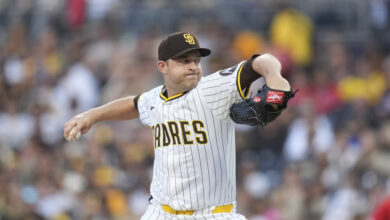
Don’t Make Much of Speculation That Mets Could Try to Take Jason Heyward Off Cubs’ Hands
This topic is worth noting because it comes from a national insider and name-checks a player many Cubs fans have been lusting to see (re)moved for a while now, but I wouldn’t put much stock in Buster Olney’s speculation about Jason Heyward. First, Olney openly admitted that it’s purely hypothetical based on one evaluator’s belief that the Mets will “take on dead money to make a trade.”
While that concept is highly plausible, the important factors here are whether the Mets would take on Heyward’s money and whether the Cubs would be willing to part with the player(s) it would take to offset the cost. I think the answer to both of those is no, but let’s dig into it a little bit more just for fun.
The first thing we should note is that Olney’s column came out prior to the news that Max Scherzer would miss 6-8 weeks with an oblique strain. That situation might have owner Steve Cohen even more desperate to make a move that can solidify his staff in the meantime. But would he be willing to take on Heyward’s remaining $42ish million through next year just to get Wade Miley or Drew Smyly?
Probably not.
What the Mets really could use, though, is a catcher. James McCann is on the IL and was only producing at a 68 wRC+ clip over 64 plate appearances. Tomás Nido has a 41 wRC+ and is striking out 38% of the time, so Willson Contreras represents a massive upgrade at the position. Trying to swing a deal like that would actually make a helluva lot more sense than reaching for a stopgap in the rotation because it impacts the team on a daily basis.
Thing is, the Cubs would have to forfeit most or all of their prospect return if the idea was to attach Heyward’s contract to Contreras simply to move the money. And I don’t know if you’ve been paying attention to the books lately, but Heyward’s salary isn’t the reason the Cubs aren’t spending more on payroll. Their actual obligation this season is about $144 million, down $6 million from last season, and their $175 million luxury tax figure is $55 million below the initial penalty threshold.
Using a Contreras trade as a vehicle to jettison Heyward’s salary would be the height of stupidity for a team that will see its payroll obligations drop markedly again next season. If it’s about clearing room on the roster, the Cubs would be better off simply designating Heyward for assignment and eating his remaining salary.
All that said, the most important mitigating factor in all this is that Heyward has full no-trade rights as a player with more than 10 years of league service time and more than five with his current team. Even if the Cubs and Mets arranged a mutually amenable trade, Heyward could veto it on a whim.
But let’s assume Heyward was cool with being moved because the Cubs are going nowhere and the Mets at least look like contenders until they inevitably foul it all up. The only way it would make sense for the Cubs to do a deal is if they overload the return to the point that New York still has to send back a big-time prospect or two. I’m talking Contreras and at least one of the pitchers being included while still eating some money.
It seemed like overkill to give up both Javier Báez and Trevor Williams in exchange for a light-hitting low-A outfielder who was rehabbing from shoulder surgery, but Pete Crow-Armstrong has become one of the organization’s top position player prospects. Likewise, the Cubs appear to have made out like bandits in their other deadline deals and even the Joc Pederson trade. Oh, and the Yu Darvish deal.
While it’s still hard to square the decision to move on from just about every star player on the roster, each day brings further evidence that the Cubs’ scouting staff did its homework well. That leads me to believe that if — and this is a huge IF — they were to swing something with the Mets, the return would end up making sense. The problem is that there are just too many factors working against that possibility.
So as happy as I know it would make a lot of you to see Heyward moved, and as helpful as such a trade would be in clearing space for younger outfielders, I think this was more a case of Olney putting words together for the hell of it.

